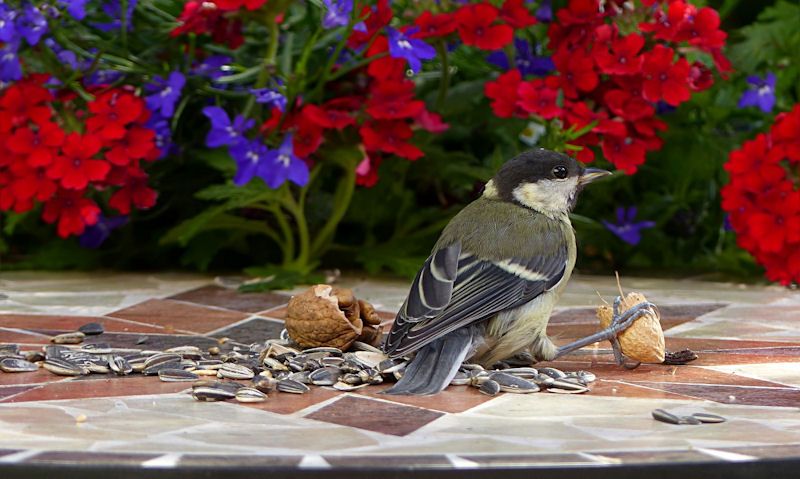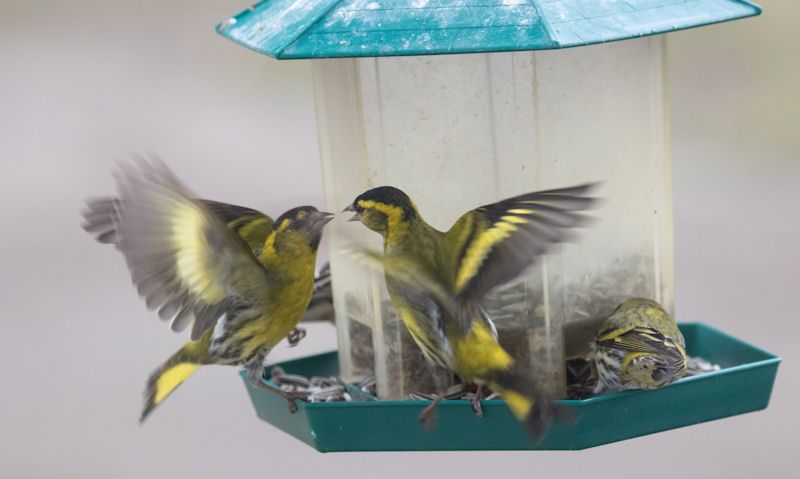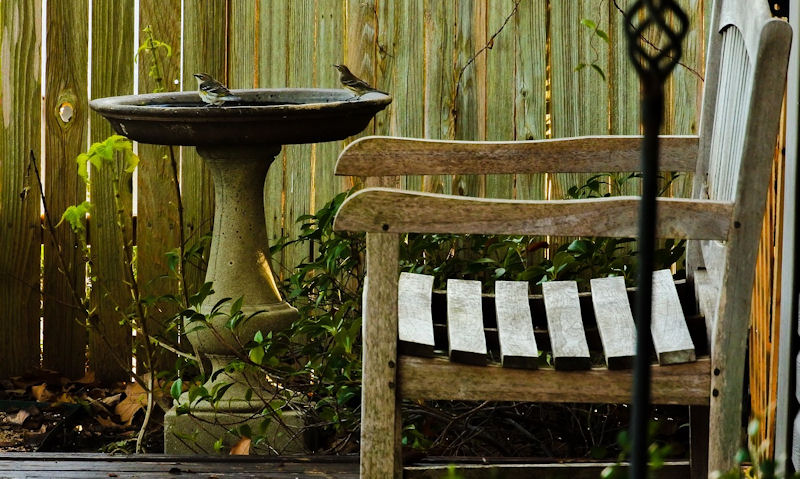Is it bad to feed birds?
You're concerned that feeding wild birds in your garden can be bad for them, well you couldn't be further from the truth if you're not careful.
It is bad to feed birds in your garden if not providing food they require, in the most hygienic way. Not all common bird feed should be offered all year unless its promoted as so, well scraps have little to no nutritional value. Its possible where there's bird feed, will attract predators.
Well it can be bad to feed birds if done from an uneducated standpoint, but its vital you keep up with feeding birds all year round, 365 days a the year.
Seasonal feeding matters where the summer time requires less hard bird feed mixes as the hackling's can choke, whereas they still need protein food.
In the autumn, winter time the nesting season is over so its now time to concentrate on the high in fat feed to help them survive over the harsh winter months.
Feeding wild birds from hanging feeders is all well and good, less so if you don't try your best to clean them out once a week to kill all living bacteria and harmful germs.
Not just feeders mind you, people leave out there scraps which could result in feed that has no nutritional value whatsoever.
And that will eventually kill them if its the only thing they're feeding on. Take bread; feeding wild birds bread is acceptable in small quantities, but only on occasions.
But if you must, make it seeded wholemeal bread, but try to only feed them the crust where the seeds are baked into only.
Take every care to feed wild birds the food they need at certain times of the year, but know where's they food left out in the garden will sure attract predators.
So keep it only within reach for wild birds, well out of range for cats or foxes.
Human intervention causes problems
You're concerned about feeding birds will result in it being bad for there health, and these concerns couldn't be further from the truth.
People who feed birds don't pay much attention to what they should be doing, but instead focusing on there own selfish needs.
That refers to offering the wrong feed at the wrong time of the year, hygiene around the feeding areas, and worst of all...
Attracting predatory cats, foxes and large birds to drop by well hurting or killing the smaller, more vulnerable birds.
Kindness can have its downside when feeding birds, so its essential you take extra care when doing so as to make sure they stay safe and healthy.
People with bad personal hygiene are not likely to recognise the need to keep feeders clean, so will not even knowledge it or even realise.
If you can't clean up at least once a week the feeding areas in your garden, then its probably best to not feed them at all.
Not just food sources mind you, if water is left out its easy to forget for a lot of people the water needs changing, followed by cleaning once a week with all other equipment.
Wild birds are perfectly capable of finding water sources and scavenging for food, but it often takes human intervention during the hardest times.
Well you're doing your best, try hard when it comes to hygiene, offering the healthiest feed which you'd need to educate yourself on, well not attracting cats or predators.
People care less about hygiene
One of the worst things about feeding wild birds in your garden is people focus more on feeding, rather than the essential clean up at the end of the week.
To be clear, its incredibly bad to not clean out your bird feeding products, as nasty bacteria builds up before transferring over to the food.
Unfortunately, its not limited to a small percentage of us, but most people never clean up after the birds are done, so bacteria is present in all your bird feeders over the garden.
To overcome this issue you must begin cleaning up after use by making a regular schedule as to what day of the week to clean up.
In case of the hanging bird feeders they take the most time and trouble, well the bird table needs a scrape before washing with soapy water.
If using bird feeding stations not only do all hanging feeders and trays need scrubbing, but don't forget to wipe off the metal pole of bird poo and gunk.
So yeah, it is bad to feed birds in your garden if you don't watch out for there health.
It will only takes 30 minutes to pull down all feeders well thoroughly washing and scrubbing each one in hot soapy water.
All equipment used must be used for washing bird products only, as to avoid risking passing on germs to the family.
Seriously, if you're up to scratch with hygiene then you don't really need telling.
Hanging feeders are the worst
Average number of hanging bird feeders in one's garden is four feeders at a time, all of which carry there own issues in regard to hygiene.
Well focusing more on the big three feeders; peanut, seeds and fat ball feeders, all of which vary in design so need care and attention.
Certain times of the year peanuts won't get eaten at all if there's a generous supply of seeds, with fat balls being a favourite of all small garden birds who are seen most.
Peanut feeders are usually metal mesh feeders with holes in as to allow birds to reach in well crushing up nuts to eat.
Problem with this feeder kind is the peanuts dry up and build up on the base and in and around the mesh holes.
So get to work early on to clean this up before the build up gets to hard to remove.
Similarly, seed feeders consist of clear plastic tubes with 2 to 6 holes around the sides for birds to reach in and take seeds.
Little issues with the holes, its more to do with the plastic tubes not being cleaned often.
And you'll know this is true as the once clean, clear plastic tubes become harder to see inside as gunk builds up on the interior.
Answer to that is get dissembling those feeders to get that tube washed and ready for use again.
If using the metal cage type feeders for fat balls or suet blocks; one thing that is bad for birds here is the fat content that passes onto the cage, to never be removed.
Grease in itself is difficult to remove, even more so if you can't see it in the first place.
Believe us when we say its there and needs to be scrubbed and washed off using a scour or hard brush.
Wrong feed, wrong time
As a matter of fact its possible to feed wild birds all year round with little incidents, only problem with that is the wrong feed can be offered when it shouldn't.
If the food you leave out for birds in your garden is promoted as all year feed, then that is just fine and should be OK continue using.
What we are talking about is the feed that is not promoted as all year, but something that you've selected because you have the feeders to hold it.
You've got the feeders but as it often happens, they shouldn't be used once in a while.
When Summer comes along this is a time when the hackling's come about, so need appropriate feed to help them digest with ease.
Peanuts or the hard ingredients contained inside fat balls are not made with chicks in mind, with a risk of them choking on the hard bits.
So at the end of Spring, early summer its time to stop feeding nuts, fat balls, suet's; or anything that has hard to swallow bits.
At this time of year wild birds need protein which is found in peanuts or fat balls, but there are other feeds that will go down a treat if offered to them.
You can still offer fat balls or suet blocks if they're promoted as all year round feed, but so can you still feed wild birds peanuts.
If you like offer them peanuts that are crushed up finely already, well allowing them to take care of the rest of it well they feed it to the young.
Better still, why not offer peanut butter for wild birds in glass jars fixed to a hanging feeder or simply lay the jar on its side.
Attracting predators
Bad thing about feeding birds in your garden is where there's food to be had, its likely to bring unwanted guests
Those guests are the nuisance neighbours cats, foxes if your live by the countryside or larger predatory birds.
Cats can't reach up and grab birds as they feed, but what they will do is pray on birds as they come to close if they don't spot a well hidden tabby.
Locatiing feed high up on a bird feeding station or wall bracket is one thing, but birds take cover in natural hedgerows or tree's beforehand, just where cats lay and wait.
Not much you can do but if you can try to scare the cats away every chance you get, which will make them fearful of ever entering your garden.
If your garden brings in foxes, the scaring tactic is unlikely to be something you can use as foxes are likely to turn around and attact you.
Foxes will be attracted to all types of smelling bird feed you leave out, and in the process will put wild birds within touching distance of the predatory fox if they get a chance.
So well you're doing a nice thing feeding wild birds, it can attract foxes or cats who are big killers of Britains wild birds.
If the problem is so bad you can't do anything to prevent predators visiting, it might be a good idea for the meantime to stop feeding birds at all.
Well larger birds that frequent your garden regularly are unlikely to attact or kill the small garden birds, it can happen and will time to time.
Small birds are intuitive, so will stay clear until the larger, nastier birds go away, so no need to do anything here on your part.
If you don't want a messy garden
People are incredibly generous feeding wild birds in there garden, and well it can come at great expense, often its your garden that is covered in mess.
And we're not talking about bird poo or feathers left behind either.
What we're referring to is the bird feed that is not the no mess wild bird feed kind will litter your garden with unwanted plants and weeds.
As birds feed on the seeds hanging in the feeder; what appears to be them throwing food about, is in fact there attempt at breaking up the seed before swallowing.
It could also be as they consume feed they need to tip the head back to allow the feed to go down there mouths.
So well its looks like they're playing, they're just trying to crush or position themselves to swallow.
Bad thing about that is if you have a lawn below the feeding area; said seeds are likely to germinate quickly and continue to grow over the next several years if not cleaned up properly.
Even so, a good clean up is not going to be enough as seeds can grow in the most unusual places.
As wild birds fly away with seeds in there beak they will drop it here and there; so don't be surprised to seed plants growing on house or shed roofs.
So if you don't want unnecessary growth scattered randomly around your garden, only stick to the non grow seed bird mix to prevent it ever happening.
Summary
People helping wild birds all year round is part and parcel of today's society, but it can often come at a great loss.
Failing to do your civil duty in regards to feeding wild birds the feed they need at certain times of the year can cause more harm then good.
Its no good throwing out scraps like bread as it offers no nutritional value, nor say the use of dried rice or pasta as it can become a choking hazard.
Educating yourself beforehand and you'll then know both rice and pasta can be fed to birds, but requies you precooking it as tosoften it up first.
Did you know its bad to feed birds peanuts in the summer time as it can cause the young to choke if fed to them by there parents.
So if its not available to them in your feeders, there's no chance they can feed it to chicks.
Alternative high in protein foods are available such as peanut butter in jars, but so to is the use of fresh fruit or dried sultanas and raises, which need soaking in water.
If using bird feeders, well convenient they can be a problem if not cleaned out regularly, as a thorough wash once a week will stop the spread of germs and bacteria.
Where you leave out food intended for birds will often attract cats and foxes, which can in turn catch and kill the birds you've encouraged into your garden.


